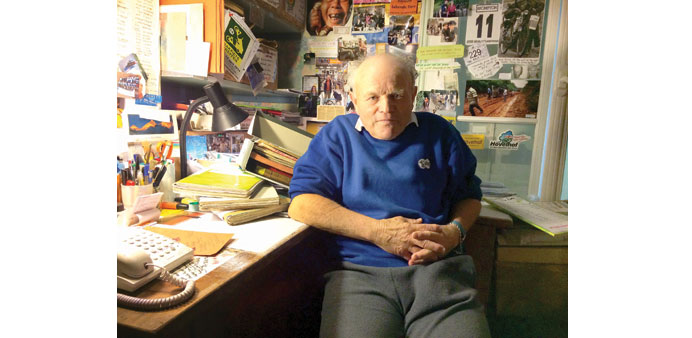BUNKER: Heinz Stuecke in his one-room apartment, which he calls his “bunker,” in Paris, France. Stuecke, 74, has been touring the world since age 20 but now plans to retire to his native Germany. Paris has been the starting point of his world tours for the past 15 years.
By Gerd Roth
“I really only meant to be gone for two years.”
So begins the story of 74-year-old Heinz Stuecke, a full-time cycle tourist who left home as a young man and never went back.
Paris-based Stuecke has cycled through more than 200 countries and territories, spending more than half a century at his obsessive feat.
In steep places like the Himalayas, the German had to get off the bike and push, but mostly he was turning his pedals, year in, year out.
If his bike wasn’t admitted — such as happened 25 years ago in Cambodia — he left it in the safe hands of friends and walked.
Stuecke’s globe-touring pushbike is a heavy-duty one which has little in common with today’s sleek aluminium-framed road cruisers. It weighs 25 kilograms, has a three-speed internal geared hub, back-pedalling brakes and 40 to 50 kilograms of world-travel luggage on it.
On the road, he spent his nights in a tent, or in cheap lodgings, or in the homes of the many people he got talking with.
They often offered a bed to Stuecke.
The world cyclist financed his travels with the help of sponsors and through the sale of photographs and brochures to casual buyers he met on street corners during his wanderings. What was the price?
“It depended on the country. Equivalent to the cost of a cup of coffee.”
Stuecke says that looking back, he doesn’t regret not having close ties to anyone or starting a family. Stuecke claims that he’s not a loner by nature. Being alone was just the means to an end, he insists.
“I did have a Russian girlfriend once,” he divulges. The relationship lasted eight years, “although I could never stand more than three weeks with her at a time.”
He’s currently still in Paris, his base for the past 15 years, but plans to move back to the land of his birth this year.
Home is the small town of Hoevelhof in the west of Germany. In the months ahead, a museum is to be built there, based on a mountain of documents and memorabilia from more than 18,000 days of travelling and bicycling going back to 1960.
His collection is still to be found in a roughly 15-square-metre Paris room that Stuecke refers to as “my bunker.” Between shelves filled with travel reports and a bicycle leaning against a narrow bed, Stuecke appears to know exactly where everything is filed.
Here, he reaches for a notebook, there he points to a folder file of photographs, all the while that he is telling a sheer endless stream of anecdotes about his experiences and the people he met. He estimates that he has pedalled more than 650,000 kilometres.
His love for bicycling and travel began during his apprenticeship, when he learned tool and die making in Hoevelhof. In the summers, he would go on cycling tours with friends. “But nobody went with me a second time,” he recalls, “because I was always racing ahead.”
On August 22, 1960, then aged 20, he undertook his first extensive tour, around the Mediterranean Sea. It did have obstacles, since Israel was off-limits and a war was going on in Algeria that summer.
It was the 1964 Summer Olympics in Tokyo that was his destination when he set out in 1962. But he only finally arrived in the Japanese capital seven years later. Stuecke then aimed to return to Germany again, “but it turned out to take more than 50 years.”
Looking back at the decades on the road, he says, “My life was so interesting that my homesickness turned into a kind of phobia against going home.”
He would occasionally visit Germany. Now he aims to return to his home country permanently.
In Hoevelhof, not only his old friends but also mayor Michael Berens are thrilled about Stuecke’s imminent return.
“The stories are really something special,” Berens said. “We have made an offer to secure his collection of items.”
For the time being, the 74-year-old will be given a building superintendent’s apartment to live in. Berens foresees an institution emerging from the “somewhat differently structured life” of the world-touring bicycle rider.
“Together with him we want to build a Heinz Stuecke Museum,” the mayor says. The next task is to get Stuecke “and all his materials transported from Paris to Hoevelhof,” he says. Until that happens, Stuecke is planning another tour.
“I’m not searching for paradise,” he assures people. But, his next destinations seem pretty close to that — Ascension Island in the Atlantic Ocean and Robinson Crusoe Island off the coast of Chile. -DPA

